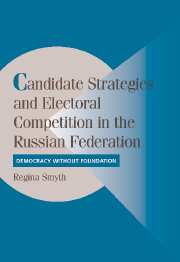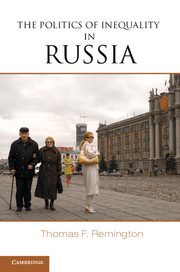Candidate Strategies and Electoral Competition in the Russian Federation
In the early 1990s, competitive elections in the Russian Federation signaled the end of the authoritarian political system dominated by a single political party. More than ten years and many elections later, a single party led by Russian President Vladimir Putin threatens to end Russia's democratic experiment. Russia's experience with new elections is not unique but it does challenge existing theories of democratic consolidation by showing that competitive elections cannot guarantee successful democratic consolidation. This book explores the conditions under which electoral competition contributes to democratic development by examining impact of elections on democratic consolidation. The theoretic framework focuses on the construction of infrastructure that transforms competitive elections into mechanisms of democratic development and shows how candidates for national parliamentary office systematically chose electoral strategies that undermined Russia's democratic foundation and created the conditions for a new single party autocracy to emerge.
- One of the first studies of semi-authoritarian or hybrid political systems
- Underscores the failure of democracy assistance aid to Russia and useful to a government audience
- Although the book focuses on Russia, it includes a broad analysis of the role of elites in post-Communist states
Reviews & endorsements
"Regina Smyth offers a persuasive argument explaining why Russia's post-communist transition has failed to result in a consolidated democracy. Emphasizing the crucial role of the choices made by politicians over how to run for parliament under Russia's mixed electoral system, Smyth shows that the aggregate effect of candidates individually-rational decisions is to deprive voters of meaningful choices over parties and policies and to subvert the accountability of government to citizens. The book is based on a substantial body of original data, including surveys of candidates in multiple elections and regions. An insightful account of Russia's political development, the study also has significant implications for other transitional regimes."
-Thomas Remington, Emory University
"The book is a must for graduate students and researchers studying Russia or democratic consolidation."
- Choice
"Regina Smyth has produced an important contribution to the study of both Russian politics and transitions from authoritarian rule."
- Henry E. Hale, George Washington University
"Smyth has given a valuable new perspective on Russia's stalled transition...The question of why is it so difficult to build stable parties and party systems is, after all, one of the key problems facing scholars of new democracies, especially post-communist ones. In this engaging and well-engaging and well-researched book, Smyth provides a powerful framework for answering this question, one that promises new insights beyond Russia."
-Conor O'Dwyer, Canadian Slavonic Papers
"Regina Smyth in her book, Candidate Strategies and Electoral Competition in the Russian Federation, provides a sophisticated explanation of why elections failed democracy in Russia. In a closely argued and empirically convincing account, she shows how candidate behavior undermined, rather than promoted, the growth of a competitive party system and democratic infrastructure. Smyth's book makes a significant contribution to the theoretical literature on how political parties develop and their role in the process of political transition as well as to our understanding of the specific Russian case."
-Cynthia S. Kaplan, Review of Politics
Product details
February 2006Adobe eBook Reader
9780511133671
0 pages
0kg
This ISBN is for an eBook version which is distributed on our behalf by a third party.
Table of Contents
- 1. Elections and the development of democratic capacity
- 2. One step forward, two steps back: Russia's failed consolidation in comparative context
- 3. The micro-foundations of democratic responsiveness: candidate strategies and electoral infrastructure
- 4. Many candidates, few choices
- 5. To join or not to join: candidate affiliation in transitional Russia
- 6. Finding fit: candidates and their districts
- 7. Campaigning for the Duma: mixed markets, mixed messages
- 8. Democrats, democratic transitions, and Russian democracy.






